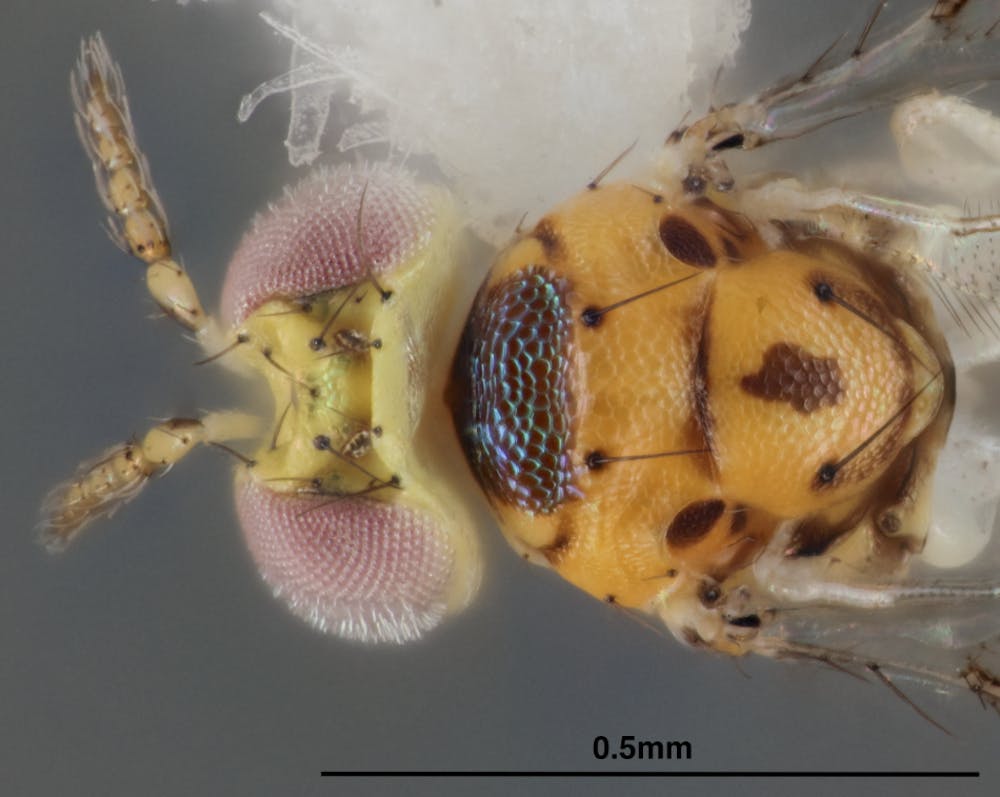Hidden in plain sight: New wasp species discovered on campus

A new wasp species, Chrysonotomyia susbelli, has been identified by a Rice research team in a ZooKeys research paper published Sept. 18, over two years since the discovery of the Valhalla wasp on campus. Chrysonotomyia susbelli is the 18th new species found on campus.
Brendan O’Loughlin, the first author of the paper, made the discovery last May while doing nature photography.
“I noticed that there was this bug that was jittering around on live oak leaves on campus, and it looked like a yellow blur,” O’Loughlin, a Wiess College senior, said. “I caught some … and looked under the microscope, and they were these really pretty gold wasps that had these dark markings.”
Chrysonotomyia susbelli is a parasitoid wasp that eats the gall wasps that lay eggs on oak trees, creating small growths known as plant galls. The wasp is just 1 millimeter in length and cannot sting. Its goldenrod hue led to its namesake, susbelli — “pig of war” in Latin.
“The hue is very different from [other species]. It reminded me of the color at Wiess,” O’Loughlin said. “I didn’t want to name it after the college directly, so I decided to name it after the war pig [mascot] instead. It’s kind of a jokey way around having to name it after an oil baron.”
Scott Egan, professor of ecology and evolutionary biology and head of the research team, said that O’Loughlin used integrative methods in identifying the species, examining the wasp with morphological, genetic, ecological, geographical and phonological methods.
“Brendan combined all of those different factors to exclude all options that led us to say, ‘Yeah, this was likely a new species,’” Egan said.
Egan said his team consulted Mike Gates, a research entomologist at the Smithsonian who specializes in the wasp’s Chalcidoidea superfamily. Former Rice graduate student Pedro Brandão-Dias, who discovered the Valhalla wasp, also co-authored the paper.
According to Egan, this discovery is the first documented case of a Chrysonotomyia wasp attacking a gall wasp in North America. Most Chrysonotomyia wasp species attack herbivores like caterpillars or moths.
“We’ve discovered this interaction that could open up a whole avenue of scientific discovery where there may be many Chrysonotomyia wasps attacking galls across North America, and we don’t even know,” Egan said. “It took our lab and Brendan’s great work to be able to at least find the initial interaction.”
Only around 10% of the world’s insects have been identified, according to biosciences professor Evan Siemann. The frequency of insects discovered indicates that most insect species in the world have not been identified yet.
“There’s actually lots of research into this question about how many species are not described,” Siemann said. “One way people get a sense of that is through how much effort it takes to find a new species. Now, once it gets to the point where it takes increasingly more and more effort to find something new, you think, ‘Okay, we’re probably running out.’ I don’t think we’re there at that point.”
Plant-feeding insects like gall wasps and resulting ecosystems on oak trees is a focus area for Egan’s evolutionary biology lab. Egan’s team is also currently identifying another species from the genus Brasema and has many other potentially unidentified species in their hands.
“My freezer in the lab is full of insects: some we know, some we don’t know for sure … and some no one’s ever seen before,” Egan said.
Egan said that knowing which organisms make up ecosystems is important for conservation efforts.
“If we don’t even know what’s here, how can we conserve it?” Egan said.
More from The Rice Thresher

On-campus meal plan changed to unlimited swipes, with 10 guest swipes per semester
Housing and Dining recently revealed a new dining plan for the upcoming semester. The required on-campus meal plan now has unlimited meal swipes, compared to 375 meal swipes last year. H&D said the previous on-campus meal plan was for students who intended to eat on campus 15 to 25 meals a week.

Rice Stadium student section relocated
The Rice Stadium student section has been relocated to sections 106 and 107, according to an announcement from Rice Athletics on X.

Scholar, mentor, cyclist: political scientist Bob Stein remembered
Robert “Bob” M. Stein, Rice professor emeritus and prominent political scientist, passed away July 18 of cancer at 75.

Please note All comments are eligible for publication by The Rice Thresher.